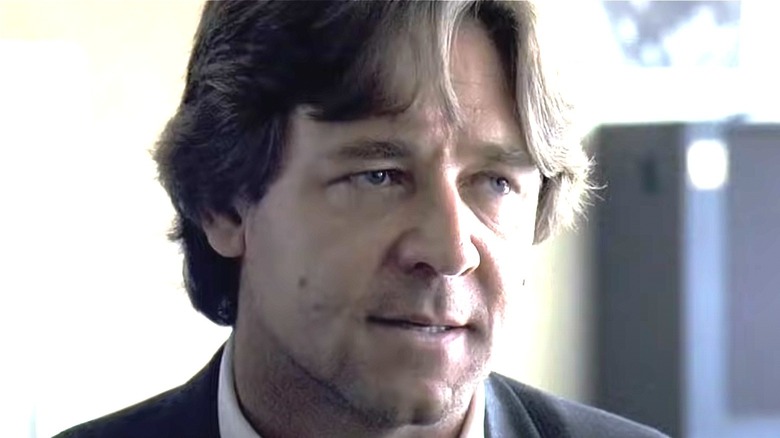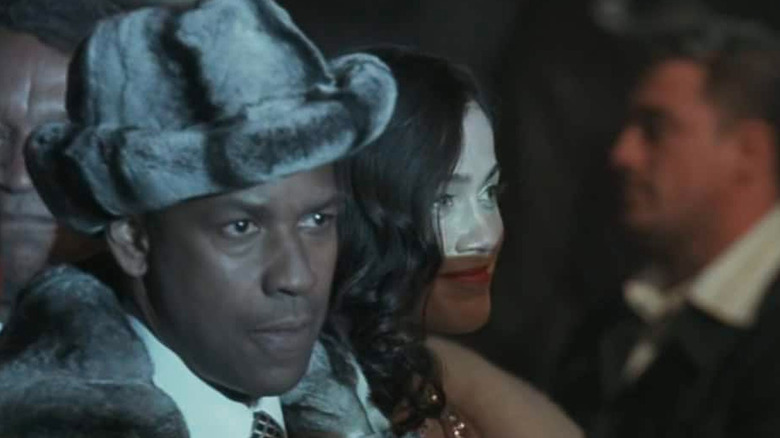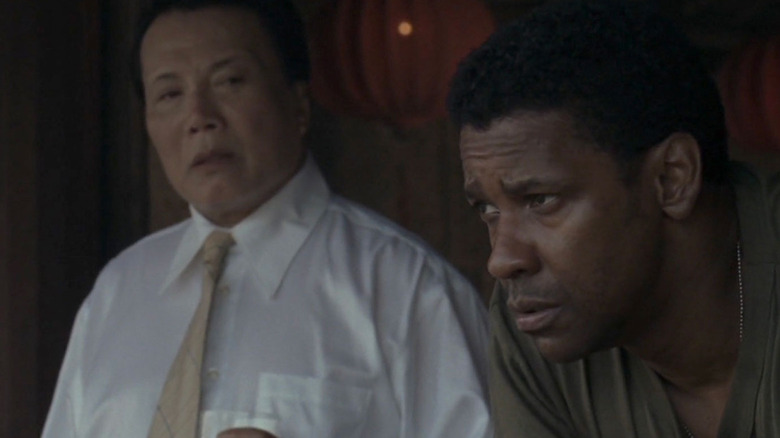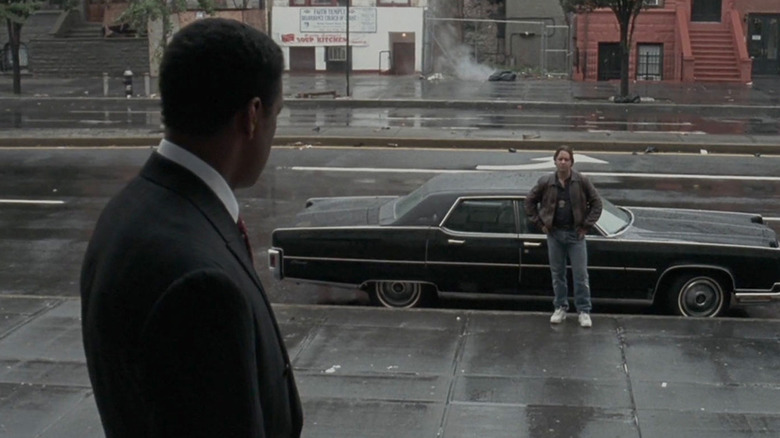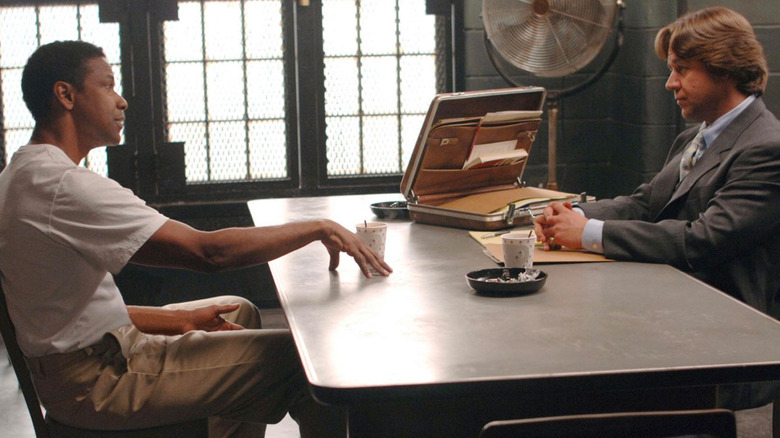The Ending Of American Gangster Explained
In 2007, Ridley Scott took on the true story of criminal mastermind Frank Lucas (Denzel Washington) and the man that brought him down, Richie Roberts (Russell Crowe), in "American Gangster." Beginning in 1968 and ending in 1991, the film saw Lucas' rise to power and ultimate demise and punishment for his long-running rule of Harlem and the drug enterprise he built there.
Written by seasoned scribe Steven Zaillian, who also penned classics like "Schindler's List," "Gangs of New York," and "Mission: Impossible," the film brought together a star-studded cast comprised of such big names as Josh Brolin, Idris Elba, Carla Gugino, Chiwetel Ejiofor, and RZA. "American Gangster" painted a classic portrayal of power, corruption, and the damage that can come from both sides of it in the process. But just how did this modern masterpiece unfold in its hair-raising finale — and which parties really suffered during the rule of Frank Lucas and the man determined to end it?
Taking a hit at The Fight of the Century
The beginning of the end for Frank Lucas all starts with him failing to take his own advice. After demanding that his brother Huey (Chiwetel Ejiofor) dress down in the future to avoid attention, Frank breaks his own rule by wearing a Wookie-sized fur coat at the Fight of the Century, the historical bout between Joe Frazer and Muhammed Ali. The wardrobe choice draws the attention of Richie Roberts, who is fascinated by a man sitting among various famous faces but rows ahead of criminal figures he seems to be on speaking terms with.
From here, Richie deduces that Lucas is a name to consider, following the trail of who he interacts with and the "businesses" he owns. During this discovery, though, the Lucas enterprise is rising and receiving strenuous competition from those who want in on Frank's action. Besides unknown heat from Roberts' investigation, Lucas crosses paths with corrupt cop Nick Trupo (Josh Brolin), who makes his own demands to get onto Frank's payroll. From here, Frank burns the coat he wore to the ill-fated fight, but it's too late — the fumes have already begun to show.
The end of a war, the beginning of another
Following several attempts on Frank's life and those closest to him, the brains behind Blue Magic gets an even greater headache when he learns the well is at risk of drying up. With the Vietnam War coming to an end, Frank's method of transporting the drugs is about to be barricaded, leading him to make a last-ditch effort to get over as much as possible before he can find an alternative solution. The only issue is that while he's trying to figure that out, another problem is hiding in plane sight (pun intended).
Among the many Lucas family members monitored by Richie's team of police, one in particular — Frank's cousin — is hauled in after he unexpectedly attempts to shoot down his girlfriend in the middle of the street. Rather than throw him in jail, Richie flips the would-be murderer to wear a wire, get in on Frank's operation, and discover just how Blue Magic is finding its way onto the streets. It's revealed that Frank has been using the caskets of dead U.S. soldiers to ship drugs from Vietnam to America. Once Richie uncovers this, the final push is made to bring the entire Lucas organization to its knees, and Frank is finally brought to justice for his crimes.
The start of a beautiful friendship
Like clockwork, Richie and his team not only infiltrate Frank's drug manufacturing base in an intense shootout, but make it to Frank in time for church finishing. In a hair-raising moment, Mr. Lucas stands at the chapel steps and is greeted by the man that brought him down. From there, the two have a showdown, not with all guns blazing, but in an interview room over spilled coffee and cigarette smoke. Frank tries to demonstrate his power and the enterprise that will see him safely out of jail, as corrupt as it is. "I took care of Harlem, and now Harlem is going to take care of me," he proclaims, which Richie ignores regardless.
The honest cop with a dishonest private life in a seemingly rotten city explains that the enemies Frank made in his drug business are coming back to collect, and seeing Frank behind bars will be more than enough. From there, Richie cuts his target a deal, asking him to name all the corrupt cops that Frank has been working with. After reluctantly agreeing, a large operation to bring in bad guys with a badge begins, including an old enemy that has been trouble for both Richie and Frank in equal measure.
Frank does time and time does Frank
From here, the always satisfying trope of a crime movie plays out, as all of Richie's hard work pays off. For every cop that's dragged into a patrol car, we see members of Frank's organization stopped by the last few good ones on the force. The pinboard Richie's team was working on quickly becomes a collage with the help of Lucas, who slowly but surely became pally with the men that brought him in. It's a partnership that pays off massively for all, not including slick-sneaky Nick Trupo, who, rather than be sentenced to time behind bars, takes the coward's way out and kills himself in his home.
From here, "American Gangster" rounds up all the outcomes of those involved and the thorough dismantling of Lucas' reign over Harlem. Thanks to his cooperation, his initial sentencing of 70 years in jail is dropped to 15, with the help of Richie, who acts as his attorney and makes Frank his first client after changing professions (which really happened). Lucas was released in 1991, but with barely a penny of the $250 million that was obtained following the investigation. Instead, the final scene shows Lucas walking out onto an empty street, but there's no fanfare waiting for a former king of Harlem, and a generation clueless to the former life of a real American Gangster.
